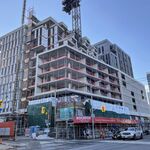nfitz
Superstar
I don't see nothing wrong with cutting most sidewalk plowing. Some parts of Toronto have never had sidewalk plowing, except along the edge of city property, or major arteries; certainly not on sidestreets.
Why should folks on suburban streets in North York, Etobicoke, and Scarborough get their sidewalks plowed, and be paying the same taxes as those who have to shovel them, themselves.
I'm happy to see that Ford is going to make his constituents in Etobicoke shovelling the snow. Perhaps it will get some of them much needed exercise.
Why should folks on suburban streets in North York, Etobicoke, and Scarborough get their sidewalks plowed, and be paying the same taxes as those who have to shovel them, themselves.
I'm happy to see that Ford is going to make his constituents in Etobicoke shovelling the snow. Perhaps it will get some of them much needed exercise.




